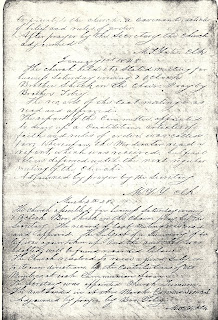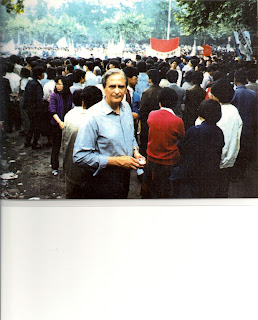
This is the original Minutes of the Shanghai Baptist Church, November, 1847, when they organized. Also known by the name Old North Gate Church, since it sat on a corner across from the North Gate of the Chinese city of Shanghai. The British and French sections north of it were still in the formative stages of development.
Matthew Tyson and Eliza Yates were the first Southern Baptist missionaries to Shanghai, just two years after the SBC was organize in August, Georgia, USA. This first meeting was held in the house where J.L. Shuck lived. Shuck had already many years experience in Hong Kong and Canton (Guangzhou). The purpose was to organize into a church. The names of those present is recorded: Rev. J. Lewis Shuck, Elvia Gable Shuck (Shuck's first wife Henriette Hall Shuck died in Hong Kong and buried in Happy Valley Cemetary up above the Happy Valley Race Course.), Rev. Matthew Tyson Yates, Eliza Emmeline M. Yates, Rev. Thomas William Toby (earlier a Canton missionary), Isabella Hall Toby, Rev. Yang, Mr. Sun. ("Seen Sang" written after their names is the way the missionaries romanized the Shanghai dialect word for "Mr." or "teacher." (Pinyin: xin sheng)
Shuck was elected moderator and pastor and Yates was secretary (this could be written by him?). Rev. Toby and wife and Mr. Yang were elected deacons.
A January 1st, 1848 meeting minutes follow and it is signed by M.T.Y, clerk (Matthew T. Yates, so this is in his handwriting. During the American Civil War years it was difficult to get funds to China missionaries and Yates worked as a translator and sometime lawyer-judge for the British colonists.

The church, small in beginning, but grew to be a ministry of hope for the Chinese population. The only other church at the time was the colonial Anglican which ministered primarily to the British and foreigners.
My wife and I came upon the church in 1980s. That is, the brick building built in the 1920s. The church did not reopen after being closed by the new Communist government in late 1950s. In 1979 men like Bishop K. H. Ting (Ding Guangxun) and Shanghai pastors petitioned the government to allow their churches to be re-opened. Some 20 Shanghai churches regained their buildings and worshipped. The Grace Baptist Church was one of those allowed to re-open, but the Old North Gate Church had been changed to a school and the government felt the school at that location was more important than a church.
We were allowed to go inside the auditorium. There an eldery gentelemen shared with my wife that he had been baptized there. The baptism pool was on the platform under the pulpit. A common practice both in America and China. It was still there but not being used naturally.
It made us remember our visit to the old Baptist Hospital in Zhengzhou, Henan province and a chance to visit the Baptist church there. Building still there but used as auditorium rather than a church. The Baptist Hospital continues as a city hospital to this day. Our friends the Fielder (Maudie and Wilson Fielder) were missionaries there from 1912 to 1950. Below is a picture of Mrs. Fielder and the church youth group, 1940. The little girl on the left side of front row is Florence Ann Fielder, age 8, pigtails and all. She is now Mrs. L.G. McKinney, former missionary to Hong Kong and Macao.

More of the little-known stuff which we have had the pleasure of encountering in our years in Taiwan (1957 to 1966); Hong Kong (1966-77 and 1982-83); and as bridge builder (of understanding) with churches in China mainland, both house churches and the open churches, 1983-1992.
Two early documentaries produced with our help in China. The FMB-backed "Winter is Past" and the SBC Radio and TV joint production with ABC-Television, "Walls and Bridges," Emmy winner for documentary, 1988-1989.





